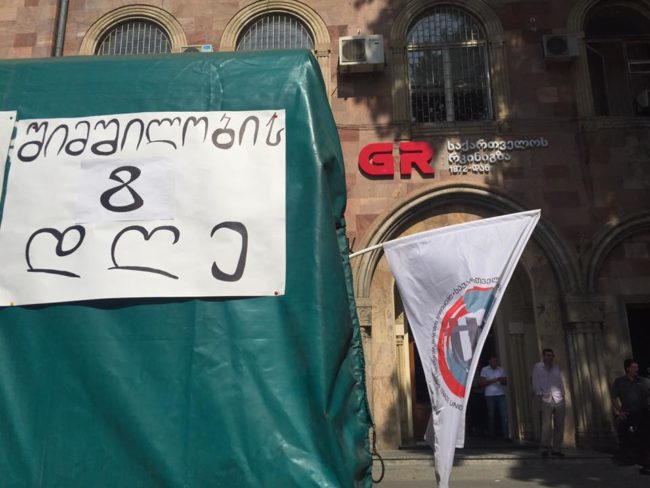

 Twelve trade unionists joined a hunger strike on 21 August against the state-owned company Georgian Railway. The company says the protesters’ demands will be met, but the strikers are calling for resignation of the company’s officials — otherwise they will not join a round table to settle the dispute.
Twelve trade unionists joined a hunger strike on 21 August against the state-owned company Georgian Railway. The company says the protesters’ demands will be met, but the strikers are calling for resignation of the company’s officials — otherwise they will not join a round table to settle the dispute.
Two railway workers launched a hunger strike on 15 August, but only one continued to protest after the second one was hospitalised the next day. The strike was triggered by Georgian Railway’s decision to move their jobs without offering them reimbursement for travel to the new location or accommodation. The protesters claim their salaries aren’t high enough to cover these additional costs.
Seven members of independent New Trade Union joined the single protester on 17 August, demanding the resignation of two Georgian Railway officials, Dachi Tsaguria, the company’s spokesperson, and Vasil Khorava, the head of infrastructure. Twelve others joined four days later.
[For details, see: Trade unionists join railway worker hunger strike in Georgia]
Officials from Georgian Railway, while addressing the strikers through media, said all the employees who had to move their jobs would be reimbursed for travel and accommodation. Trade unionists responded with criticism and said it was ‘late for a verbal agreement’:
Ilia Lezhava, the head of New Trade Union, told OC Media on 23 August that ‘communication via media will not end the process’. According to Lezhava, ‘verbal agreement on the terms of employment is not enough anymore. They [the administration] already missed this chance. The labour dispute needs to be settled properly’.
The protesters are now calling for negotiation. ‘We need to exchange positions, an agreement with the consent of both sides must be signed. This is a standard labour dispute, and the administration needs to provide a space for negotiations, invite the striking employee with his representatives — lawyers and trade unionists — and involve a state mediator’, Lezhava told OC Media. The President’s Parliamentary Secretary Ana Dolidze has offered to step in to mediate the dispute.
The agreement should be signed only after both sides consent, Lezhava added. However, trade unionists said they will negotiate with the company only after the two officials, Dachi Tsaguria and Vasil Khorava resign.
‘There is no ground for protest’
According to Nana Klarjeishvili, the head of Georgian Railway’s legal department, the company, after recent reorganisation, was forced to reduce the number of its staff at the infrastructure department from 800 to 200. Netgazeti quoted Klarjeishvili saying that the company offered them alternative jobs.
‘We offered this after a preliminary agreement and the staff agreed on the reorganisation with their signatures’, Klarjeishvili said.
‘The reorganisation affected overall 1,429 employees and only one of them, Khvtisiashvili is against’, she added, claiming that ‘there is no ground for protest’.
The spokesperson for Georgian Railway, Dachi Tsaguria didn’t respond to OC Media’s request for a comment by the time the story was published. Earlier, Tsaguria called the protests ‘politically motivated’, but did not specify what he meant.









